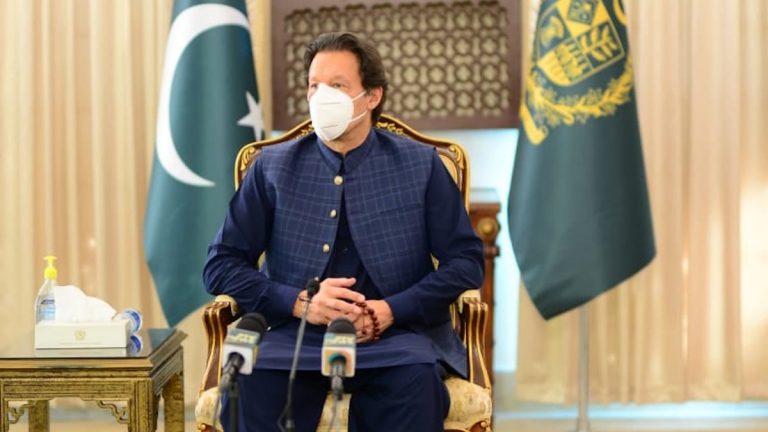
SOURCE: THE PRINT
An agency within the Pakistan government has warned that Prime Minister Imran Khan’s decision, granting provisional provincial status to Gilgit-Baltistan (G-B), could be used to accuse the country of “abandoning Kashmir”, which will also adversely affect the “Kashmir freedom movement”.
An internal assessment conducted by the National Security Division (NSD), which works under the Pakistan Prime Minister’s Office (PMO), also says that India could use the announcement to justify its actions of 5 August 2019, when it stripped Jammu and Kashmir of its special status.
The assessment has been accessed by ThePrint through sources in the Indian security establishment.
The NSD assessment also says that the Imran Khan government would face resistance from the political leadership in Pakistan-occupied Kashmir, especially in the run-up to the PoK Legislative Assembly election scheduled in 2021 and can lead to a wedge between G-B and PoK.
Pakistan had last month agreed to grant provisional provincial status to Gilgit-Baltistan, the disputed northernmost territory administered by Pakistan.
India has strongly protested Pakistan’s move to make G-B its fifth province and to hold legislative elections there later this month, asserting that Jammu and Kashmir and Ladakh, including Gilgit-Baltistan, are an integral part of India by virtue of its fully legal and irrevocable accession and Pakistan had “no locus standi on territories illegally and forcibly occupied it”.
Earlier this month, according to a news report in the Pakistan media, the government and the opposition there had reached consensus on the issue.
The report said that the people of Gilgit-Baltistan have long demanded special status and an end to constitutional limbo for the region, which is directly run by the government.
Soon after Pakistan’s decision, Sayyid Abdullah Gillani, the special representative in PoK of the top Hurriyat leader Syed Ali Shah Geelani, said that such a step is “laden with disastrous consequences”.
“Pakistan risks not only weakening its position and losing the moral high ground but also demoralising Kashmiri people and debilitating their ongoing struggle for the right to self-determination,” Gillani said in a statement.
In his speech Sunday, Prime Minister Khan said he could not announce or talk about development packages for the newly-carved province given the upcoming local elections. He said that special efforts were being taken to connect G-B to the rest of Pakistan as the area had suffered due to poor connectivit
Help shift focus, justify scrapping 370
The assessment by Pakistan’s NSD also says that the decision will shift the spotlight on PoK and G-B, instead of “Indian actions of August 5”.
The assessment further says that Pakistan’s narrative on J&K would face increased international scrutiny and questions would be raised as to how India’s actions are any different from subsequent Pakistani actions.
In the assessment, the NSD has also recommended promoting a narrative that the action by Pakistan was in response to “popular demand from G-B”, besides “re-adjusting the narrative on J&K to focus more on human rights violations and international law”.
According to a source in the Indian security establishment, the Tehreek-e-Kashmir in Denmark had also, in an internal communication, said that G-B’s new status may impact and weaken Pakistani position on Kashmir in the UN and through international law.
The organisation said that the current action seemed like an endorsement of the revocation of Article 370 by India and that it will reduce the number of Muslim votes in the area for the eventual referendum.
‘Not a well-thought decision’
Indian analysts ThePrint spoke to said there appears to be confusion in the Pakistani establishment over the decision.
Author and National Security Advisor Board member, Tilak Devasher, said Imran Khan announcing provincial status for G-B, despite this assessment by the NSD and the Special Advisor in Pakistan’s NSD, Moeed Yusuf, stating that no decision had been taken on G-B, shows that they are not clear on what they want.
“The Special Advisor in NSD earlier said that no decision has been taken on G-B, and now Pakistan PM has taken a U-turn and announced provincial status for the territory. It shows that there is confusion among those in Pakistan’s establishment,” he said.
“They are not clear on what they want and it is not a well-thought-out decision,” he added. “If G-B is made part of Pakistan as its province, so called ‘Azad Kashmir’ is bound to protest this decision.”
“Moreover, India doesn’t have to justify its action of 5 August, making this a basis. India’s action is independent of this,” Devasher said. “Also, India does not have to create a wedge between G-B and PoJK, Pakistan is doing it themselves.”
In early October, the Pakistan-occupied Kashmir President Sardar Masood Khan had also opposed and ruled out any change in the status of G-B, which he said could harm the ongoing Kashmir liberation movement.
Addressing a function held in Pakistan to mark the 73rd founding day of the government of PoK Saturday, Khan had also said that no talks will be held with India in the present situation and if India wants to hold talks, it must withdraw all actions taken about Kashmir after August 5, 2019.
Commenting on the issue, author and counter-terrorism expert Ajai Sahni said Pakistan’s decision will have “no significant impact” and that it is “immaterial to India”.
“These things are decided on de facto circumstances and by the equation of power. The fact is that PoK and G-B have been under Pakistani control since 1948, just as Jammu and Kashmir has been in India’s,” he said. “Whatever internal changes you make will make no difference to the equation of power between the two countries.
“You will, of course, have a few statements from the ‘international community’, some moralising, but that is about it,” he added. “Just like it happened after revocation of Article 370 in J&K. Some statements came but nothing that impacted significantly on India’s status, power or security.”






